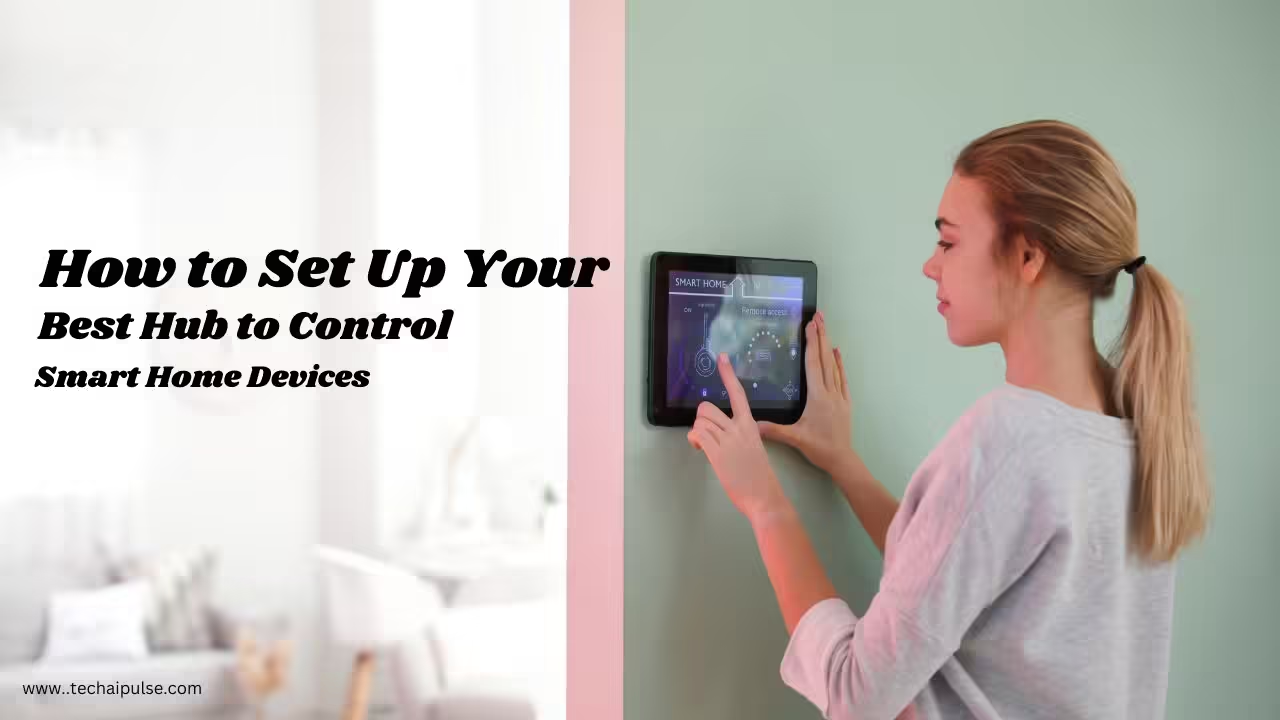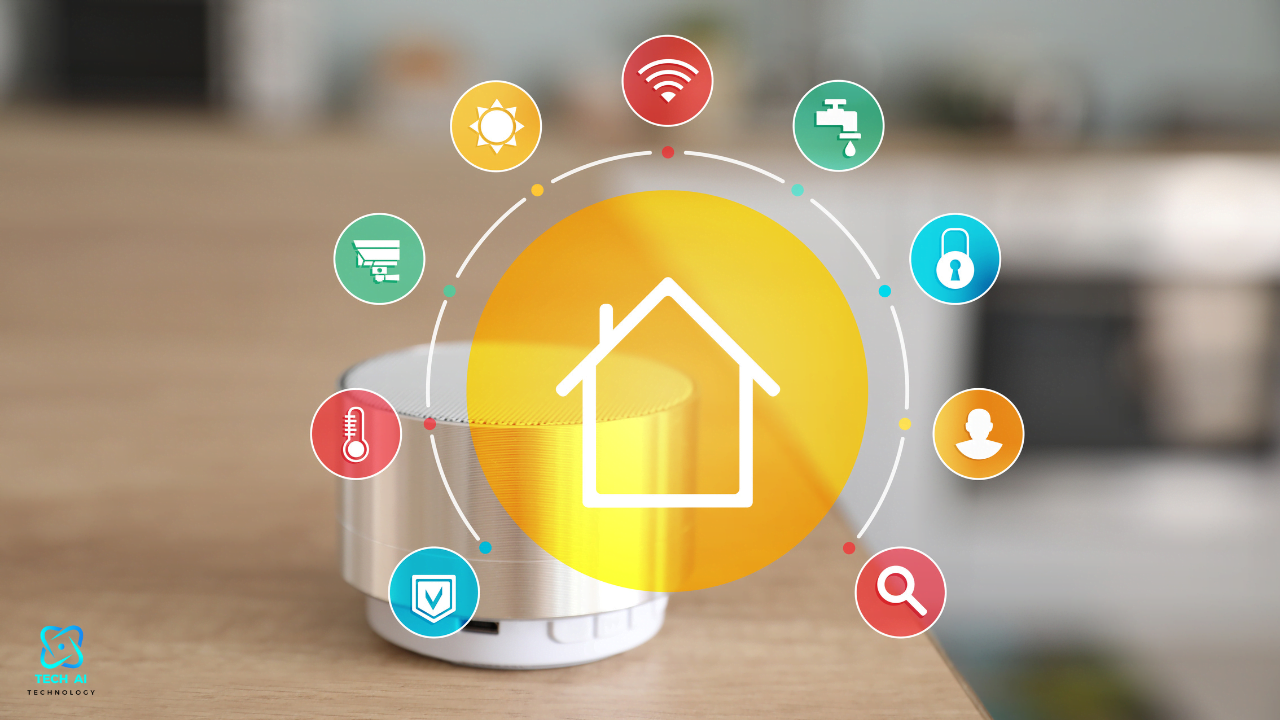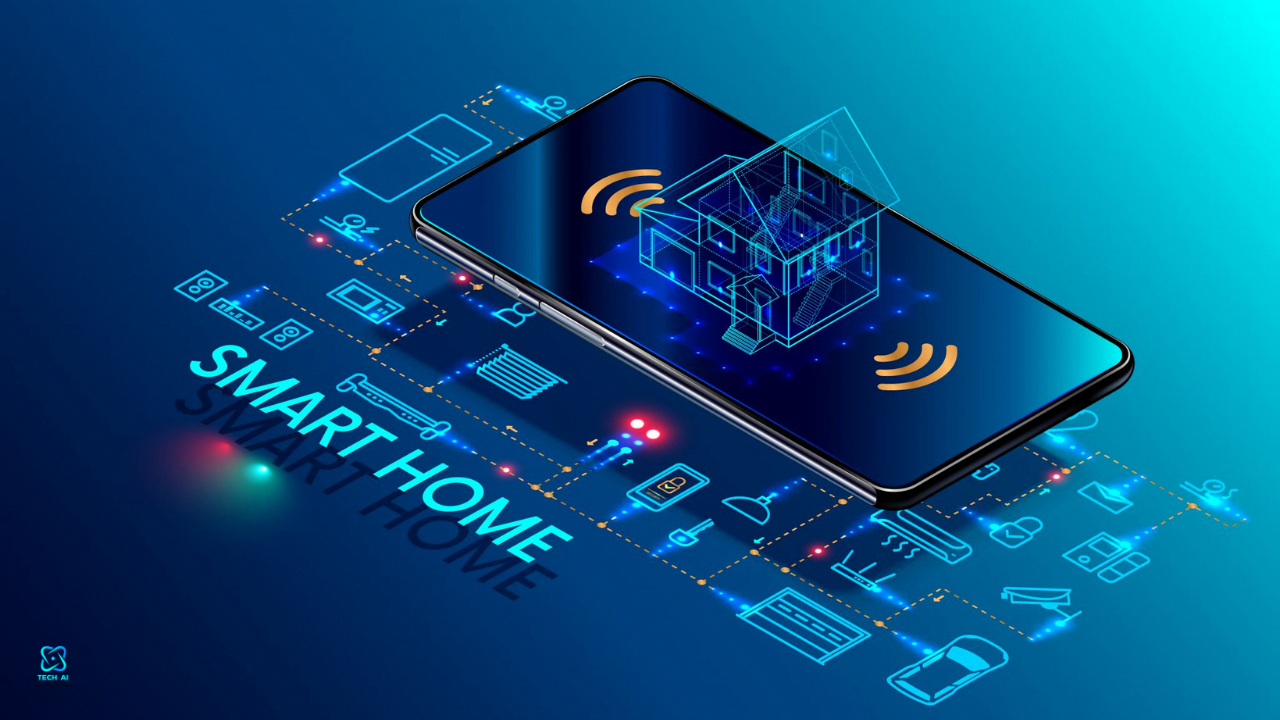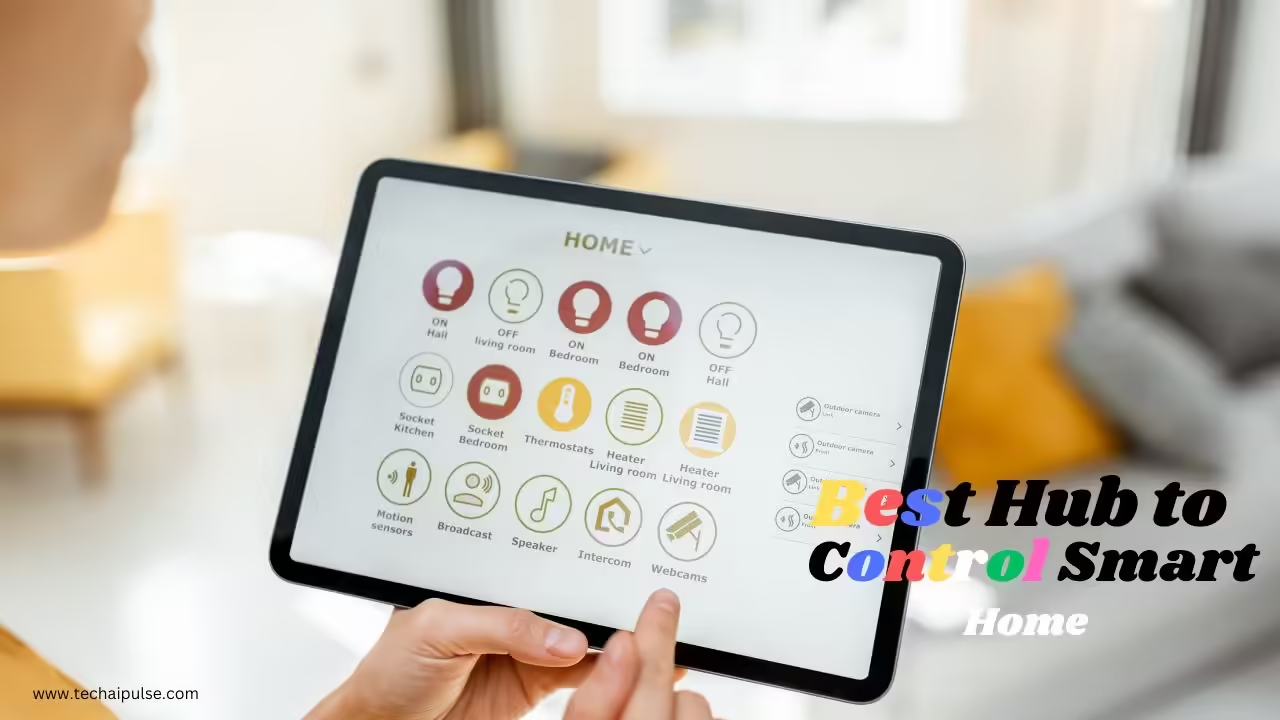Controlling your smart home in 2025 requires more than just voice commands it needs a powerful, best home control hub that seamlessly connects all your devices. From smart lighting systems and Wi-Fi enabled security cameras to AI powered automation hubs, the latest innovations ensure smoother, more intelligent home management.
Whether you need a wireless home automation hub for hands free control or a multi device smart home controller with top tier compatibility, choosing the right system enhances efficiency, security, and convenience. In this guide, we’ll explore the best options, must have features, and the latest advancements shaping smart home hubs this year!
Best Home Control Hub: Top Smart Hubs for 2025
A home control hub is essential for managing smart devices in one place. The best home control hub in 2025 offers AI powered automation, voice control, and multi device compatibility.
It connects with smart lights, security systems, thermostats, and voice assistants like Alexa, Google Assistant, and Siri. With Matter, Zigbee, and Z-Wave support, the latest hubs ensure seamless smart home integration. A good hub enhances security, simplifies automation, and improves energy efficiency.
What Is a Home Control Hub?
A home automation hub connects smart devices and allows them to work together. It supports Wi-Fi home automation, remote access, and voice commands. The latest models include AI driven security features, real time monitoring, and custom automation routines. With a smart home controller, you can manage everything from a single app or voice assistant.
Key Features to Look for in 2025
- Device Compatibility: Works with Matter, Zigbee, Z-Wave, and Wi-Fi smart devices.
- AI Powered Automation: Creates custom smart home routines based on your lifestyle.
- Voice Assistant Support: Compatible with Alexa, Google Assistant, and Siri.
- Security & Privacy: Includes end to end encryption and biometric authentication.
- Remote Control: Access and manage your home from anywhere via a mobile app.
Top Home Control Hubs in 2025
1. Amazon Echo Hub: Best for Alexa Users
Supports Matter smart home devices. Features a touchscreen interface and AI powered automation.
2. Google Nest Hub Max: Best for Google Assistant
Offers facial recognition, voice control, and seamless Google Home integration.
3. Samsung SmartThings Station: Best for Multi Device Control
Works with Matter, Zigbee, and Z-Wave. Provides fast automation and local processing.
4. Apple HomePod Mini: Best for HomeKit Users
Ensures secure smart home automation. Uses Siri for voice control and adaptive sound recognition.
5. Hubitat Elevation: Best for Privacy Focused Users
Operates without cloud dependency. Offers local smart home automation for faster responses.
How to Choose the Best Home Control Hub
Select a hub based on your smart home setup, preferred voice assistant, and required connectivity. Look for AI automation, real time security updates, and energy saving features. A good hub should provide easy control, automation, and enhanced security for a smarter home experience.
What Is a Home Control Hub? A Complete Guide to Smart Home Automation

Definition and Purpose of a Smart Home Automation Hub
A home control hub is the central system that connects and manages all smart devices in a home. It acts as a command center, allowing users to control smart lights, door locks, security cameras, thermostats, and more from one place.
The hub ensures seamless communication between devices, even if they use different wireless protocols like Zigbee, Z-Wave, Wi-Fi, or Bluetooth. With a smart hub, homeowners can automate tasks, create schedules, and enhance security.
How a Home Control Hub Connects and Manages Smart Devices
A smart home hub functions as a bridge between various smart devices, ensuring they work together efficiently. It connects to the internet and communicates with devices using wireless signals. Users can control everything through a mobile app, voice assistant, or remote interface.
For example, a hub can turn off smart lights, lock doors, or adjust thermostats based on preset conditions. Advanced hubs use AI powered automation, learning user preferences to optimize home settings.
Differences Between a Home Automation Hub, Smart Speaker, and Smart Bridge
A home automation hub is a dedicated device for managing multiple smart devices. It supports complex automation routines and provides enhanced security.
A smart speaker, like Amazon Echo or Google Nest, primarily focuses on voice control. While it can control smart devices, it relies on cloud based processing and may have limited automation features compared to a dedicated hub.
A smart bridge acts as a translator, enabling specific devices, like Philips Hue lights, to connect with broader ecosystems. Unlike a hub, it doesn’t manage multiple devices across different protocols.
How a Smart Home Hub Works in 2025
A smart home hub is the control center for all connected devices in a home. It ensures seamless communication between smart lights, thermostats, security systems, and more. These hubs use multiple wireless communication protocols to connect devices and automate tasks efficiently.
Communication Protocols: Matter, Zigbee, Z-Wave, Wi-Fi, and Bluetooth
Smart home hubs rely on different protocols to link devices. The latest Matter protocol in 2025 ensures universal compatibility, reducing connectivity issues. Zigbee and Z-Wave offer low power mesh networks for smart sensors, security cameras, and smart locks. Wi-Fi and Bluetooth remain essential for high speed connections, smart speakers, and wearables. Choosing the right protocol impacts speed, reliability, and energy efficiency.
Role of AI and Voice Assistants
AI driven voice assistants like Alexa, Google Assistant, and Siri enhance automation. In 2025, AI powered hubs provide predictive automation, learning user habits to optimize energy use and security. Voice control and AI driven scheduling improve convenience. Smart hubs also integrate machine learning algorithms, enabling adaptive smart home routines without manual programming.
Cloud Based vs. Local Smart Home Hubs
Cloud based smart home hubs offer remote access and AI driven automation. However, they rely on the internet, raising privacy concerns. Local smart hubs prioritize speed and data security, working offline with edge computing for faster response times. Many 2025 smart hubs use a hybrid approach, balancing AI driven cloud benefits with local processing for privacy.
Key Features to Look for in the Best Home Control Hub (2025)

Smart home control hubs have evolved significantly in 2025, offering better connectivity, AI powered automation, and enhanced security. Choosing the right hub ensures seamless integration, energy efficiency, and an improved user experience. Here are the essential features to consider:
1. Device Compatibility: Seamless Integration with Smart Home Ecosystem
A top tier home control hub must support major protocols like Matter, Zigbee, Z-Wave, and Wi-Fi. This ensures compatibility with smart lights, thermostats, security cameras, and other IoT devices. Look for hubs that allow cross platform communication and effortless device pairing to build a unified smart home system.
2. AI Powered Automation: Smarter Routines and Self Learning Features
The best home hubs in 2025 feature AI driven automation, adapting to user preferences over time. These hubs use machine learning algorithms to optimize routines, such as adjusting lighting, temperature, and security based on activity patterns. Automated scene settings enhance comfort, convenience, and energy savings.
3. Voice Control: Hands Free Operation with Virtual Assistants
Modern home hubs integrate with Alexa, Google Assistant, and Siri for hands free control. Users can issue voice commands to adjust lights, lock doors, or check security feeds. Advanced natural language processing (NLP) improves recognition, making interactions smoother and more intuitive.
4. Security & Privacy: End to End Encryption and Biometric Authentication
Data protection is crucial for smart home security. Leading hubs offer end to end encryption, biometric authentication, and offline processing to prevent cyber threats. Look for multi layer security features, including firewall protection and secure cloud backups, to safeguard personal data.
5. User Friendly Interface: Touchscreen vs App Based Control
A touchscreen smart hub provides an interactive display for quick access to settings. However, app based control systems allow remote adjustments via smartphones or tablets. The best hubs offer intuitive navigation, customizable dashboards, and real time device status updates.
6. Remote Access & Mobile App Support: Control from Anywhere
The ability to control smart devices from anywhere is essential. A robust mobile app should offer instant notifications, remote security access, and real time automation control. Integration with cloud services ensures smooth operation even when away from home.
7. Energy Efficiency & Sustainability: Smart Energy Monitoring
Energy efficient hubs support smart power management, real time energy monitoring, and automated power saving routines. Features like solar panel integration, carbon footprint tracking, and smart plugs help homeowners reduce energy waste and optimize electricity usage.
8. Multi User & Customization Options: Personalized Automation
A smart home should cater to all residents. The best hubs support multi user profiles, allowing each family member to have personalized settings. Features like geo fencing, scheduled automation, and custom notifications enhance usability and flexibility.
5 Best Home Control Hubs in 2025 (Comparison Guide)
Smart home control hubs are essential for managing connected devices efficiently. In 2025, the best home automation hubs offer AI driven automation, Matter compatibility, and enhanced security. Below is a comparison of the top rated smart home hubs based on ecosystem integration, privacy, and device support.
1. Amazon Echo Hub: Best for Alexa Ecosystem
Amazon Echo Hub is the ultimate choice for Alexa based smart homes. It features a built in touchscreen, AI powered automation, and Matter support, ensuring seamless control of smart lights, locks, and security cameras. With voice commands, users can control devices hands free, making it perfect for home automation enthusiasts.
2. Google Nest Hub Max: Best for Google Assistant Users
Google Nest Hub Max is designed for Google ecosystem users who rely on Nest smart devices. It offers facial recognition, real time monitoring, and seamless integration with Google Home. The built in camera allows for video calls, while Google Assistant provides intuitive voice control for smart home devices.
3. Samsung SmartThings Station: Best for Multi Device Control
Samsung SmartThings Station supports Matter, Zigbee, and Z-Wave, making it ideal for homes with various smart home brands. It enables AI driven automation and cloud free local processing, ensuring fast and secure smart home control. Compatible with multiple devices, it’s the best choice for versatile automation setups.
4. Apple HomePod Mini: Best for Apple HomeKit Users
Apple HomePod Mini is the go to smart home hub for HomeKit users. It features end to end encryption, Siri voice control, and seamless compatibility with HomeKit enabled devices. With adaptive audio and personalized automation, it offers a secure and privacy focused smart home experience.
5. Hubitat Elevation: Best for Privacy Focused Users
Hubitat Elevation prioritizes local smart home automation, ensuring no cloud dependency for maximum privacy. It delivers faster response times, enhanced security, and full offline functionality. Ideal for those concerned about data security and smart home privacy, it provides total control over IoT devices without relying on external servers.
Which Smart Home Hub is Best for You?
Choosing the best home automation hub depends on device compatibility, ecosystem preference, and privacy needs. Whether you prefer Alexa, Google Assistant, HomeKit, or a standalone automation system, the right hub enhances smart home efficiency in 2025
5 Benefits of Using a Home Control Hub
A home control hub is the centralized platform that connects and manages all smart home devices. It streamlines automation, enhances security, and improves efficiency. Here’s why every smart home needs one:
1. Simplifies Smart Home Management
Managing multiple smart gadgets can be overwhelming. A home automation hub integrates everything—smart lights, thermostats, security cameras, and voice assistants—into a single platform. This creates a seamless user experience, reducing the need for multiple apps.
2. Enhances Home Security
A home hub connects smart locks, security cameras, motion detectors, and alarm systems for real time monitoring. Get instant mobile alerts for suspicious activity and remotely control door locks and surveillance systems for added protection.
3. Improves Energy Efficiency
Smart hubs optimize energy consumption with AI powered thermostats, automated lighting, and smart plugs. They adjust settings based on usage patterns, reducing electricity bills and supporting an eco friendly lifestyle.
4. Enables Hands Free Control
Voice enabled hubs, like Amazon Echo, Google Nest Hub, or Apple HomePod, allow AI driven voice automation. Control lights, temperature, entertainment systems, and more using simple voice commands for a truly hands free experience.
5. Future Proof Smart Home Setup
Modern hubs support Matter, Zigbee, Z-Wave, and Wi-Fi smart devices, ensuring compatibility with future tech. Investing in a hub ensures your smart home remains up to date with the latest automation standards.
A smart home hub simplifies daily life, making homes safer, more efficient, and future ready. Want the best home automation system? Choose a hub that supports AI, energy savings, and security integration for a seamless smart living experience. 🚀
How to Choose the Best Home Control Hub for Your Smart Home

A smart home control hub is essential for managing multiple devices seamlessly. Choosing the right hub ensures compatibility, security, and future expansion. Here’s what you need to consider when selecting the best home automation hub in 2025.
1. Identify Your Smart Home Ecosystem
Choosing the best home control hub starts with identifying your ecosystem. Do you use Amazon Alexa, Google Home, Apple HomeKit, or a multi platform setup? Some hubs work best with a specific ecosystem, while others support multiple platforms. Ensure your hub integrates with your preferred voice assistant for seamless control.
2. Check Compatibility with Existing Devices
Your hub must support your existing smart home devices. Look for hubs that support Matter, Zigbee, Z-Wave, or Wi-Fi based devices. Matter certified hubs are future proof, ensuring compatibility with the latest smart home gadgets. Check for direct device pairing options to avoid extra bridges or dongles.
3. Decide Between Local vs Cloud Based Hubs
A local home automation hub processes commands internally, offering better privacy, faster response times, and offline functionality. Cloud based hubs, like SmartThings or Google Home, provide remote access and advanced AI automation but may depend on internet connectivity. Choose based on your privacy needs and convenience preferences.
4. Look for AI Driven Automation Features
Modern hubs use AI powered automation for smart scheduling, energy optimization, and real time adjustments. Features like machine learning routines, adaptive lighting, and predictive climate control enhance efficiency. AI driven hubs can learn your habits and optimize device interactions automatically.
5. Prioritize Security & Privacy
Security is critical in smart homes. Choose a hub with end to end encryption, two factor authentication, and local processing options. Hubs with offline functionality prevent unauthorized access. Regular firmware updates ensure protection against evolving cyber threats. Privacy conscious users should prefer hubs that limit data sharing.
6. Consider Budget & Future Expansion
Smart home hubs vary in price. Budget friendly hubs work well for basic setups, while premium hubs offer advanced automation, multi device control, and extended compatibility. Consider scalability will your hub support future device additions and software updates? Investing in a future proof hub ensures longevity.
Future Trends in Smart Home Control Hubs (Beyond 2025)

AI Powered Smart Homes
The future of smart home control hubs revolves around advanced AI automation. AI driven systems will offer predictive learning, adapting to user behavior and preferences. Voice assistants will evolve, understanding context better and providing seamless home automation.
Smart hubs will integrate machine learning to enhance security, optimize energy use, and improve user experience. Expect fully autonomous homes, where AI anticipates needs without manual input.
Matter & Universal Compatibility
The Matter protocol will revolutionize smart home connectivity. It ensures universal compatibility across brands like Google, Apple, and Amazon. Future hubs will support interoperable smart devices, reducing setup complexity.
Homeowners will enjoy a truly unified ecosystem, allowing seamless smart device communication. This shift eliminates vendor lock in, providing more flexibility and cross platform integration.
More Privacy Focused Solutions
Privacy concerns will drive the adoption of local AI processing. Smart hubs will store and process data on device, reducing reliance on cloud services. Enhanced encryption and blockchain based authentication will secure smart home networks against cyber threats.
User controlled privacy settings will give homeowners full control over data sharing, reinforcing trust in connected technologies.
Smart Home Sustainability
Eco friendly smart home innovations will dominate future trends. AI powered hubs will optimize energy efficiency, automating lighting, heating, and cooling for reduced consumption. Solar integrated smart homes will become mainstream, enabling self sustaining energy systems.
Smart hubs will monitor carbon footprints, ensuring sustainable living through automated power management and eco conscious device usage.
FAQs:
Q1. What is the best home control hub in 2025?
The best home control hub in 2025 depends on your smart home ecosystem. Amazon Echo Hub is great for Alexa users, Google Nest Hub Max works best with Google Assistant, and Samsung SmartThings Station offers wide compatibility with Matter, Zigbee, and Z-Wave devices.
Q2. Why do I need a home control hub?
A smart home hub connects and manages multiple smart devices from one central system. It improves automation, enhances security, and ensures seamless voice and app control over lights, thermostats, security cameras, and other smart gadgets.
Q3. Which home automation hub supports Matter, Zigbee, and Z-Wave?
Samsung SmartThings Station and Hubitat Elevation support Matter, Zigbee, and Z-Wave, making them ideal for users with multiple smart home devices. These hubs allow better interconnectivity and future proofing.
Q4. Is a cloud based or local home control hub better?
Cloud based hubs (e.g., Amazon Echo Hub, Google Nest Hub) offer remote access and AI driven automation, while local hubs (e.g., Hubitat Elevation) provide faster response times, better privacy, and no internet dependency.
Q5. Can I control my smart home without a hub?
Yes, many smart devices work independently using Wi-Fi and smartphone apps. However, a home control hub centralizes automation, enhances performance, and enables voice control with Alexa, Google Assistant, or Siri.
Q6. What is the most secure home control hub?
For privacy focused users, Hubitat Elevation and Apple HomePod Mini are top choices. They process automation locally, reducing data exposure to the cloud, and offer strong encryption for smart home security.
Q7. Does a home automation hub save energy?
Yes, the best smart home hubs optimize energy usage by automating thermostats, lights, and appliances, reducing power consumption. Features like AI powered energy monitoring and smart scheduling help lower electricity bills.
Q8. How do I set up a home control hub?
- Choose a hub compatible with your smart home devices.
- Connect it to Wi-Fi or Ethernet.
- Pair devices using Matter, Zigbee, Z-Wave, or Bluetooth.
- Configure settings via the mobile app.
- Set up voice control with Alexa, Google Assistant, or Siri.
Q9. What is the best budget friendly home control hub?
For an affordable yet powerful option, Amazon Echo Hub and Google Nest Hub offer smart home automation at a lower price while supporting Matter compatible devices.
Q10. How do I future proof my smart home hub?
Choose a Matter supported hub, ensure compatibility with Zigbee and Z-Wave, and look for AI driven automation features. Opt for hubs that receive regular software updates and support expanding smart home ecosystems.
Conclusion:
Choosing the best home control hub in 2025 depends on your smart home setup and needs. Whether you prefer Amazon Echo Hub for Alexa, Google Nest Hub for Google Assistant, or a Samsung SmartThings Station for wider compatibility, the right hub will simplify automation, improve security, and enhance energy efficiency.
With Matter, Zigbee, and Z-Wave support, future proofing your smart home is easier than ever. Invest in a hub that fits your ecosystem and enjoy seamless smart home control with voice commands and automation. 🚀

